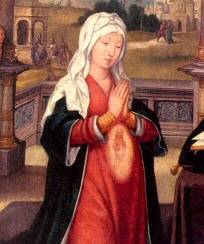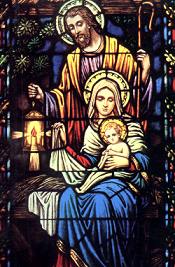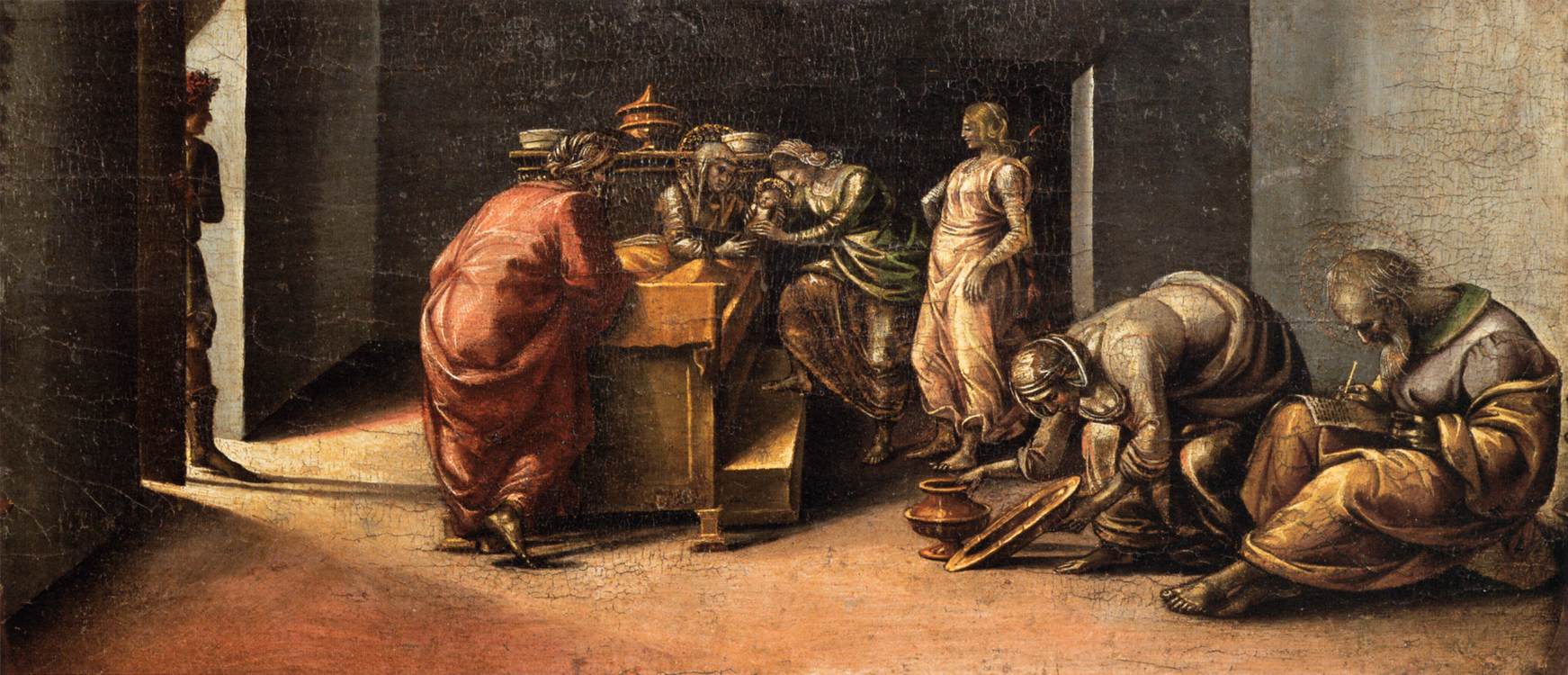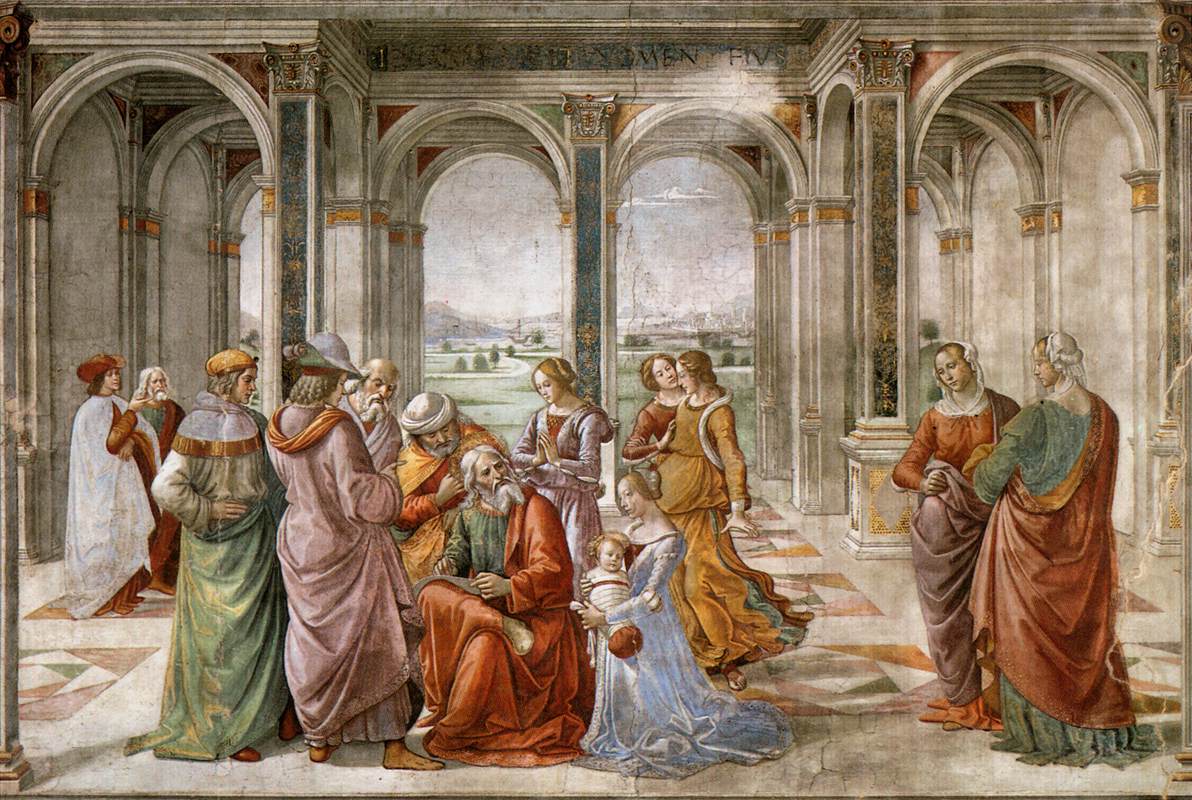67. And his father Zacharias was filled with the Holy Ghost, and prophesied, saying,
68. Blessed be the Lord God of Israel; for he has visited and redeemed his people.
AMBROSE; God in His mercy and readiness to pardon our sins, not only restores to us what He has taken away, but grants us favors even beyond our expectations. Let no one then distrust Him, let no one from consciousness of past sins despair of the Divine blessing. God knows how to change His sentence, if you have known how to correct your sin, seeing he that was long silent prophesies; as it is said, And Zacharias was filled with the Holy Spirit.
CHRYS. That is, "with the working of the Holy Spirit;" for he had obtained the grace of the Holy Spirit, not in any manner, but fully; and the gift of prophecy shone forth in trim; as it follows, And he prophesied.
ORIGEN; Now Zacharias being filled with the Holy Spirit utters two prophecies, the first relating to Christ, the second to John. And this is plainly proved by those words in which he speaks of the Savior as present and already going about in the world, saying, Blessed be the Lord God of Israel, for he has visited, &c.
CHRYS. Zacharias, when he is blessing God, says, that He has visited His people, meaning thereby either the Israelites in the flesh, for He came to the lost sheep of the house of Israel; or the spiritual Israel, that is, the faithful, who were worthy of this visitation, making the providence of God of good effect towards them.
THEOPHYL; But the Lord visited His people who were pining away as it were from long sickness, and by the blood of His only begotten Son, redeemed them who were sold under sin. Which thing Zacharias, knowing that it would soon be accomplished, relates in the prophetic manner as if it were already passed. But he says, His people, not that when He came He found them His own, , but that by visiting He made them so.
69. And has raised up an horn of salvation for us in the house of his servant David.
THEOPHYL. God seemed to be asleep, disregarding the sins of the multitude, but in these last times coming in the flesh, He has risen up and trodden down the evil spirits who hated us. Hence it is said, And he has raised up an horn of salvation to us in the house of his servant David.
ORIGEN; Because Christ was born of the seed of David, according to the flesh, it is said, A horn of salvation to us in the house of his servant David; as it has also elsewhere been said, A vineyard has been planted in a horn, i.e. in Jesus Christ.
CHRYS. Now by a horn he means power, glory, and honor, deriving it metaphorically from the brute creatures, to whom God has given horns for defense and glory.
THEOPHYL; The kingdom of our Savior Christ is called also the horn of salvation, because all our bones are clothed with flesh, but the horn alone stretches beyond the flesh; so the kingdom of Christ is called the horn of salvation, as reaching beyond the world and the delights of the flesh. According to which figure David and Solomon were consecrated by the horn of oil to the glory of the kingdom.
70. As he spoke by the mouth of his holy prophets which have been since the world began.
THEOPHYL. That Christ was born of the house of David, Micah relates, saying, And you, Bethlehem, are not the least in the city of Juda, for out of you shall come a governor who shall rule my people Israel. But all the prophets spoke of the Incarnation, and therefore it is said, As he spoke by the month of his holy prophets.
GREEK EX. Whereby he means that God spoke through them, and that their speech was not of man.
THEOPHYL; But he says, Which have been since the world began. Because all the Scriptures of the Old Testament were a constant prophecy of Christ. For both our father Adam himself, and the other fathers, by their deeds bore testimony to His dispensation.
71. That we should be saved from our enemies, and from the hand of all that hate us.
THEOPHYL; Having first briefly said, He has raised up a horn of salvation to us, he goes on to explain his words, adding, of salvation from our enemies. As if he said, He has raised up to us a horn, i.e. He has raised up to us salvation from our enemies, and from the hand of all who hate us.
ORIGEN; Let us not suppose that this refers to our bodily enemies, but our ghostly. For the Lord Jesus came mighty in battle to destroy all our enemies, that He might deliver us from their snares and temptation.
72. To perform the mercy promised to our forefathers, and to remember his holy covenant;
73. The oath which he swore to our father Abraham,
74. That he would grant to us.
THEOPHYL; Having announced that the Lord, according to the declaration of the Prophet, would be born of the house of David, he now says, that the same Lord to fulfill the covenant He made with Abraham will deliver us, because chiefly to these patriarchs of Abraham's seed was promised the gathering of the Gentiles, or the incarnation of Christ. But David is put first, because to Abraham was promised the holy assembly of the Church; whereas to David it was told that from him Christ was to he born. And therefore after what was said of David, he adds concerning Abraham the words, To perform the mercy promised to our fathers, &c.
ORIGEN; I think that at the coming of our Lord and Savior Jesus Christ, both Abraham, Isaac, and Jacob, were partakers of His mercy. For it is not to be believed, that they who had before seen His day, and were glad, should afterwards derive no advantage from His coming, since it is written, Having made peace through the blood of his Cross, whether in earth or in heaven.
THEOPHYL. The grace of Christ extends even to those who are dead, because through Him we shall rise again, not only we, but they also who have been dead before us. He performed His mercy also to our forefathers in fulfilling all their hopes and desires. Hence it follows, And to remember his holy covenant, that covenant, namely, wherein he said, Blessing, I will bless you, and multiplying, I will multiply you. For Abraham was multiplied in all nations, who became his children by adoption, through following the example of his faith. But the fathers also, seeing their children enjoy these blessings, rejoice together with them, just as if they received the mercy in themselves.
Hence it follows, The oath which he swore to our father Abraham, that he would grant to us.
BASIL; But let no one, hearing that the Lord had sworn to Abraham, be tempted to swear. For as when the wrath of God is spoken of, it does not signify passion but punishment; so neither does God swear as man, but His word is in very truth expressed to us in place of an oath, confirming by an unchangeable sentence what He promised.
74. That we, being delivered out of the hands of our enemies, might serve him without fear.
CHRYS. Having said that a horn of salvation had risen up to us from the house of David, he shows that through it we are partakers of His glory, and escape the assaults of the enemy As he says, That being delivered out of the hands of our enemies, we might serve him without fear. The two things above mentioned will not easily be found united. For many escape danger, but fail of a glorious life, as criminals discharged from prison by the king's mercy. On the other hand, some reap glory, but are compelled for its sake to encounter dangers, as soldiers in war embracing a life of honor are oftentimes in the greatest peril. But the horn brings both safety and glory. Safety indeed as it rescues us from the hands of our enemies, not slightly but in a wonderful manner, insomuch that we have no more fear, which are his very words; that being delivered from the hand of our enemies, we might serve him without fear.
ORIGEN; Or in another way; Frequently are men delivered from the hands of the enemy, but not without fear. For when fear and peril have gone before, and a man is then plucked from the enemies' hand, he is delivered indeed, but not without fear. Therefore said he, that the coming of Christ caused us to be snatched from the enemies' hands without fear. For we suffered not from their evil designs, but He suddenly parting us from them, has led us out to our own allotted resting place.
75. In holiness and righteousness before him, all the days of our life.
CHRYS. Zacharias glorifies the Lord, because He has made us to serve Him with full confidence, not in the flesh as Judah did with the blood of victims, but in the spirit with good works. And this is what he means by in holiness and righteousness. For holiness is, a proper observance of our duty towards God, righteousness of our duty towards man; as, for example, when a man devoutly performs the Divine commands, and lives honorably among his fellow men. But he does not say "before men," as of hypocrites desirous to please men, but "before God," as of those whose praise is not of men, but of God; and this not once or for a time; but all the days of their life, as it is said, all our days.
THEOPHYL; For whosoever either departs from God's service before he dies, or by any uncleanness stains either the strictness or purity of his faith, or strives to be holy and righteous before men, and not before God, does not yet serve the Lord in perfect freedom from the hand of his spiritual enemies, but after the example of the old Samaritans endeavors to serve equally the Gods of the Gentiles, and his Lord.
76. And you, child, shall be called the Prophet of the Highest: for you shall go before the face of the Lord to prepare his ways.
AMBROSE; In prophesying of the Lord he rightly addresses the prophet, showing that prophecy also is a gift of the Lord, in order that he might not, while enumerating public benefits, seen to be so ungrateful as to be silent of his own. Hence it is laid, And you, child, shall be called the Prophet of the Highest.
ORIGEN; The reason I suppose that Zacharias hastened to speak to his son, was because he knew that John was shortly about to be a sojourner in the wilderness, and that he himself should see him no more.
AMBROSE; Now perhaps some may think it an absurd extravagance of the mind to address a child of eight days old. But if we keep our eyes fixed upon higher things, we surely can understand that the son might hear the voice of his father, who before he was born heard the salutation of Mary. The Prophet knew that there were certain organs of healing in a Prophet which were unclosed by the Spirit of God, not by the growth of the body. He possessed the faculty of understanding who was moved by the feeling of exultation.
THEOPHYL; Unless indeed Zacharias be supposed to have wished as soon as he was able to speak, to proclaim for their instruction who were present, the future gifts of his son, which he had long before learnt from the Angel. Let the Arians however hear that our Lord Christ, whom John went before prophesying of Him, Zacharias calls "the Most High," as it is said in the Psalms, A man was as born in her, and the most highest has established her.
CHRYS. But as kings have their companions in arms, who stand nearest to them, so John, who was the friend of the Bridegroom, went before Him nigh to His coming. And this is what follows, For you shall go before the face of the Lord to prepare his ways. For some prophets have preached the mystery of Christ at a distance, but he preached it nearer the time, that he might both see Christ, and declare Him to others.
GREG. But all they who by preaching cleanse the hearts of their hearers from the filth of their sins, prepare a way for the coming of wisdom into the heart.
77. To give knowledge of salvation to his people by the remission of their sins.
THEOPHYL. For the manner in which the forerunner prepared the way of the Lord he explains, adding, To give knowledge of salvation. The Lord Jesus is salvation, but the knowledge of salvation, i.e. of Christ, was given in John, who bore witness of Christ.
THEOPHYL; For as if desiring to explain the name of Jesus, i.e. the Savior, he frequently makes mention of salvation, but lest men should think it was a temporal salvation which was promised, he adds, for the forgiveness of sins.
THEOPHYL. For in no other way was He known to be God, but as having forgiven the sins of His people. For or it is of God alone to forgive sins.
THEOPHYL; But the Jews prefer not to receive Christ, but to wait for Antichrist; for they desire to be delivered not from the dominion of sin within, but from the yoke of man's bondage without.
78. Through the tender mercy of our God; whereby the day-spring from on high has visited us.
THEOPHYL. Because God has forgiven our sins not for our works sake, but through His mercy, it is therefore fitly added, Through the tender mercy of our God.
CHRYS. Which mercy we find not indeed by our own seeking, but God from on high has appeared to us, as it follows; Whereby (i.e. by His tender mercy) the day-spring from on high (that is, Christ) has visited us, taking upon Him our flesh.
GREEK EX. Abiding on high yet present upon the earth, suffering neither division nor limitation, which thing neither can our understanding embrace, nor any power of words express.
79. To give light to them that sit in darkness and in the shadow of death, to guide our feet into the way of peace.
THEOPHYL; Christ is rightly called the Day-spring, because He has disclosed to us the rising of the true light, as it follows; To give light to them that sit in darkness and in the shadow of death.
CHRYS. By darkness he means not material darkness, but error or and distance from the faith, or ungodliness. BASIL; For in thick darkness were the Gentile people sitting, who were sunk deep in idolatry, until the rising light dispersed the darkness, and spread abroad the brightness of truth.
GREG. But the shadow of death is taken to mean the forgetfulness of the mind. For as death causes that which it kills to be no longer in life, so whatever oblivion touches ceases to be in the memory. Hence the Jewish people who were forgetful of God are said to sit in the shadow of death. The shadow of death is taken also for the death of the flesh, because as that is the true death, by which the soul is separated from God, so that is the shadow of death by which the flesh is separated from the soul. Hence in the words of the martyrs it is said, the shadow of death has come over us. By the shadow of death also is represented the following of the devil, who is called Death, in the Revelations, because as a shadow is formed according to the quality of the body, so the actions of the wicked are expressed according to the manner of their following him.
CHRYS. He rightly says sitting, for we were not walking in darkness, but sitting down as having no hope of deliverance.
THEOPHYL. But not only does the Lord at His rising give light to those who sit in darkness, but he says something further as it follows, to direct our feet in the way of peace. The way of peace is the way of righteousness, to which He has directed our feet, i.e. the affections of our souls.
GREG. For we guide our steps in the way of peace, when we walk in that line of conduct wherein we depart not from the grace of our Maker.
AMBROSE; Mark also, in how few words Elisabeth prophesies, in how many Zacharias, and yet each spoke filled with the Holy Spirit; but this discipline is preserved, that women may study rather to learn what are the Divine commands than to teach them.
Catena Aurea Luke 1


 The entire liturgy of Christmas Eve is consecrated to the anticipation of the certain and sure arrival of the Savior: "Today you shall know that the Lord shall come and tomorrow you shall see His glory" (Invitatory of Matins for the Vigil of the Nativity). Throughout Advent we have seen how the preparation for Jesus' coming became more and more precise. Isaiah, John the Baptist and the Virgin Mother appeared throughout the season announcing and foretelling the coming of the King. We learn today that Christ according to His human nature is born at Bethlehem of the House of David of the Virgin Mary, and that according to His divine nature He is conceived of the Spirit of holiness, the Son of God and the Second Person of the Trinity.
The entire liturgy of Christmas Eve is consecrated to the anticipation of the certain and sure arrival of the Savior: "Today you shall know that the Lord shall come and tomorrow you shall see His glory" (Invitatory of Matins for the Vigil of the Nativity). Throughout Advent we have seen how the preparation for Jesus' coming became more and more precise. Isaiah, John the Baptist and the Virgin Mother appeared throughout the season announcing and foretelling the coming of the King. We learn today that Christ according to His human nature is born at Bethlehem of the House of David of the Virgin Mary, and that according to His divine nature He is conceived of the Spirit of holiness, the Son of God and the Second Person of the Trinity.  It must be so that the grown-ups may devote themselves with a quiet mind, unhindered by any commotion, to these great mysteries of the Holy Night, that in most Catholic countries the giving of gifts has been advanced to Christmas Eve.
It must be so that the grown-ups may devote themselves with a quiet mind, unhindered by any commotion, to these great mysteries of the Holy Night, that in most Catholic countries the giving of gifts has been advanced to Christmas Eve.  The opening of the eternal gates through which the King of Glory may enter is indicated by the wreath on the door of our homes at Christmastide. The Advent wreath, which accompanied the family throughout the season of preparation may be taken down. The violet ribbons are removed, and it is gloriously decorated with white and gold. It is then placed upon the door as a symbol of the welcome of Christ into our city, our home and our hearts. On Christmas Eve the whole house should be strewn with garlands and made ready for the Light of the World. The crib is set in a special place of honor, for tonight the central figure of the Nativity scene is to arrive.
The opening of the eternal gates through which the King of Glory may enter is indicated by the wreath on the door of our homes at Christmastide. The Advent wreath, which accompanied the family throughout the season of preparation may be taken down. The violet ribbons are removed, and it is gloriously decorated with white and gold. It is then placed upon the door as a symbol of the welcome of Christ into our city, our home and our hearts. On Christmas Eve the whole house should be strewn with garlands and made ready for the Light of the World. The crib is set in a special place of honor, for tonight the central figure of the Nativity scene is to arrive. 






